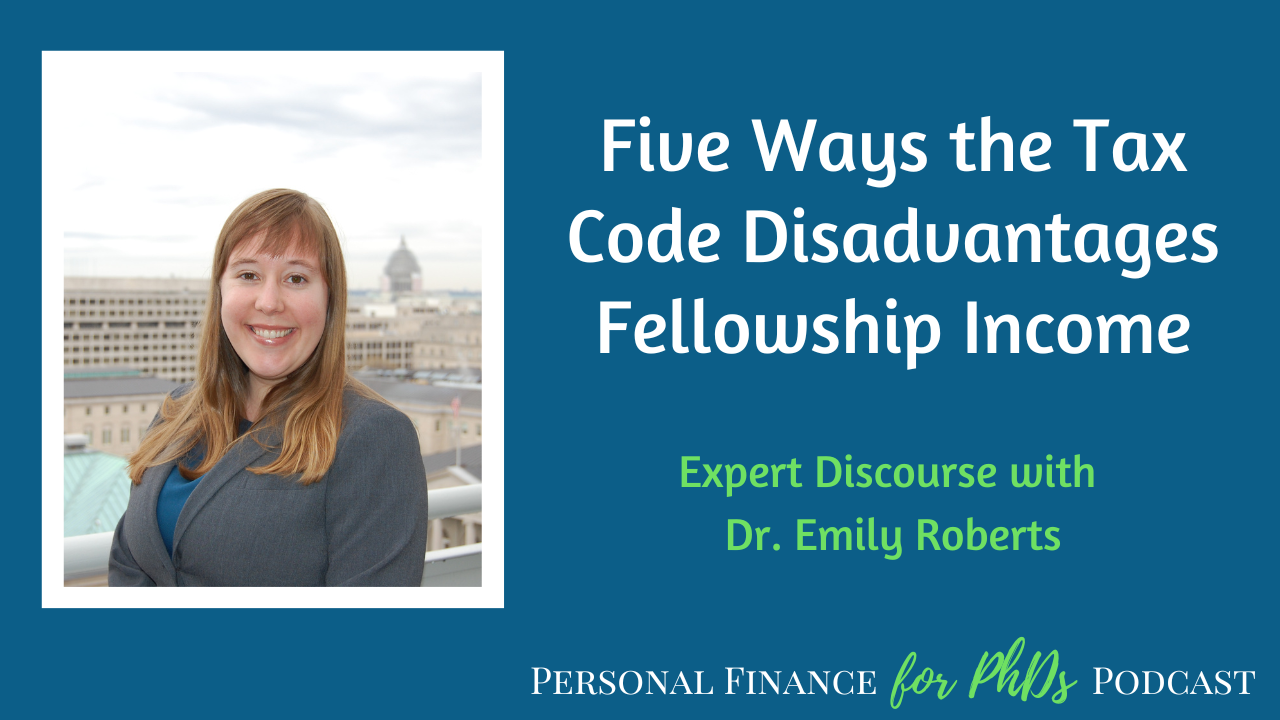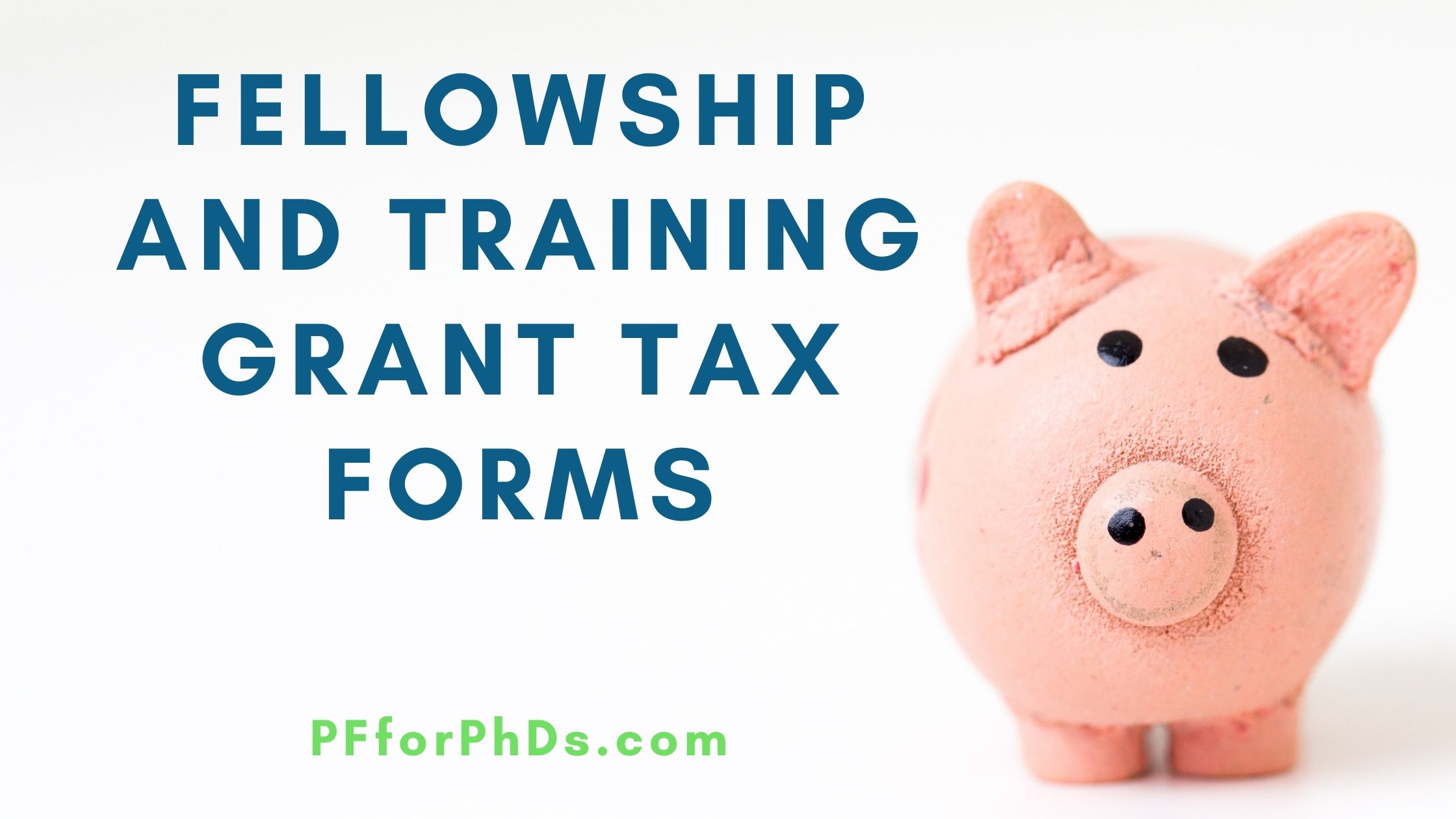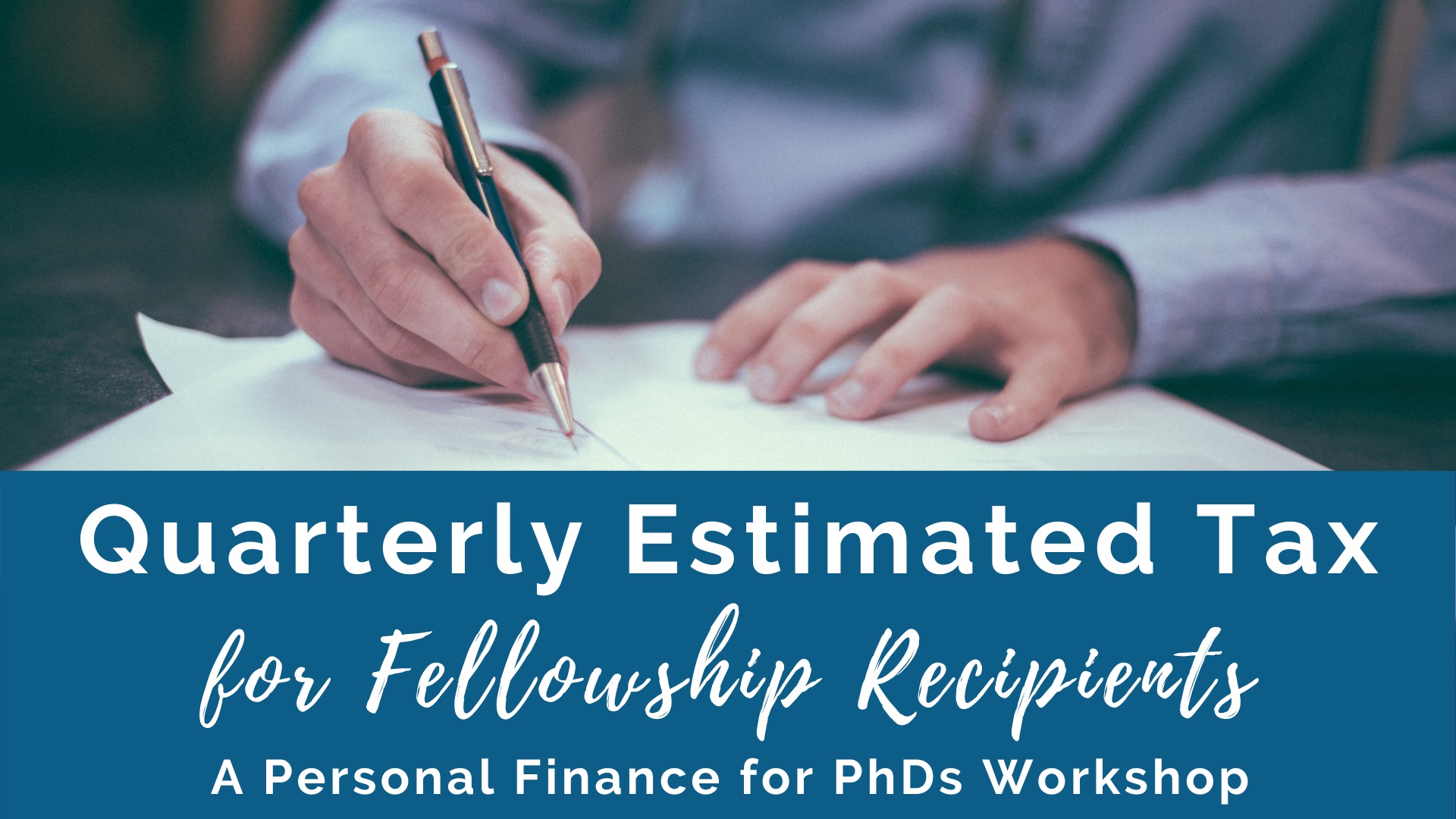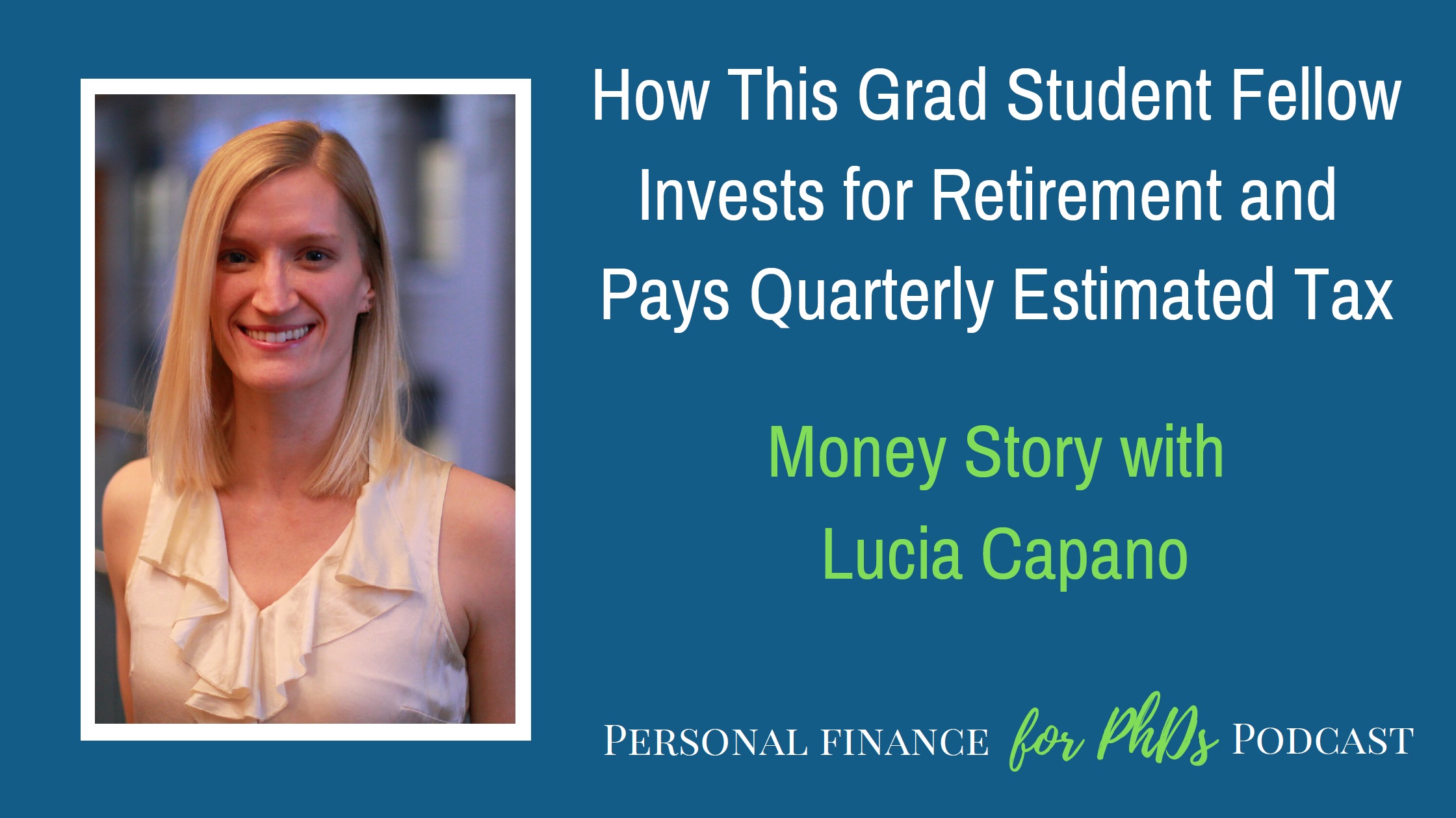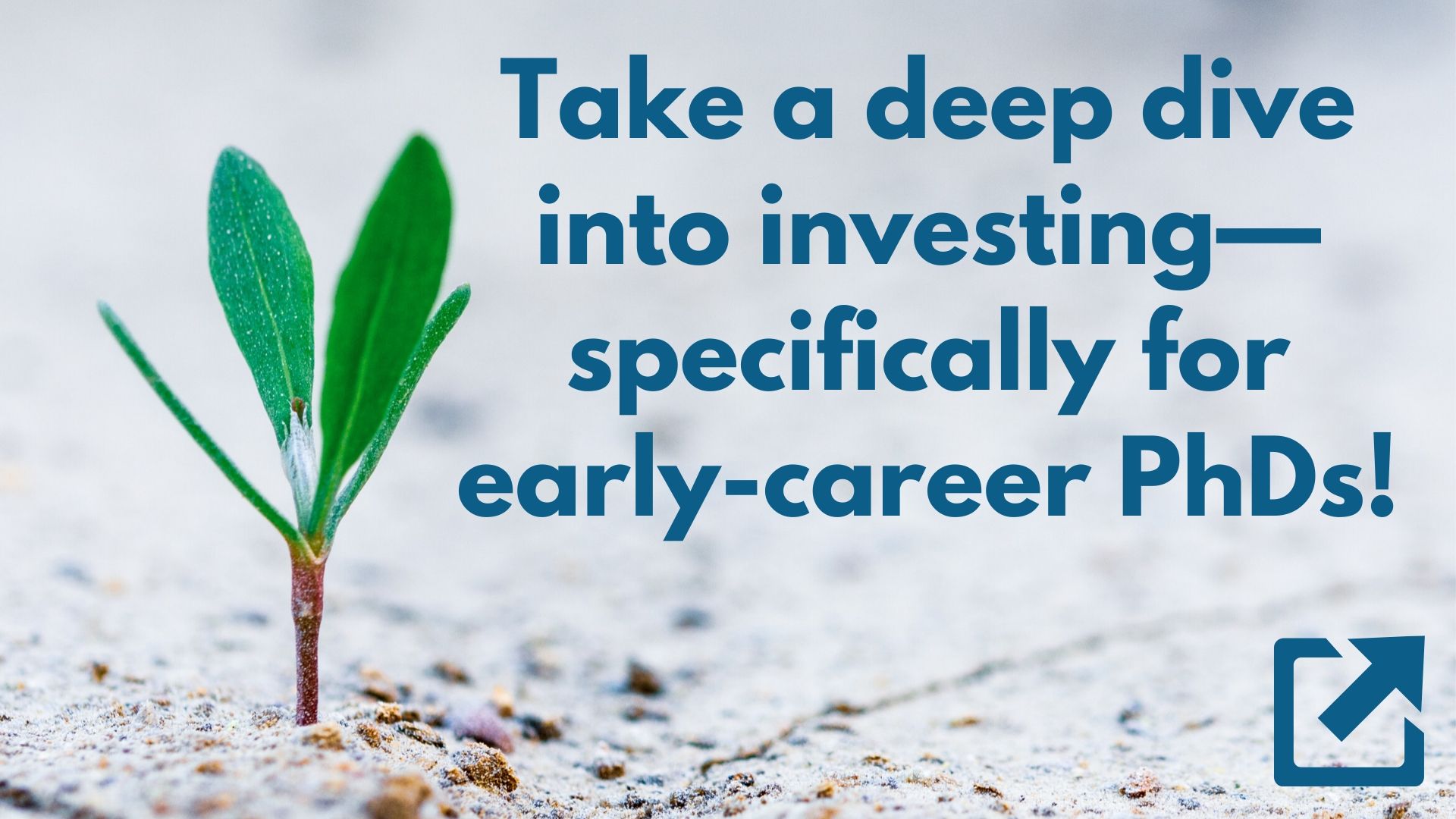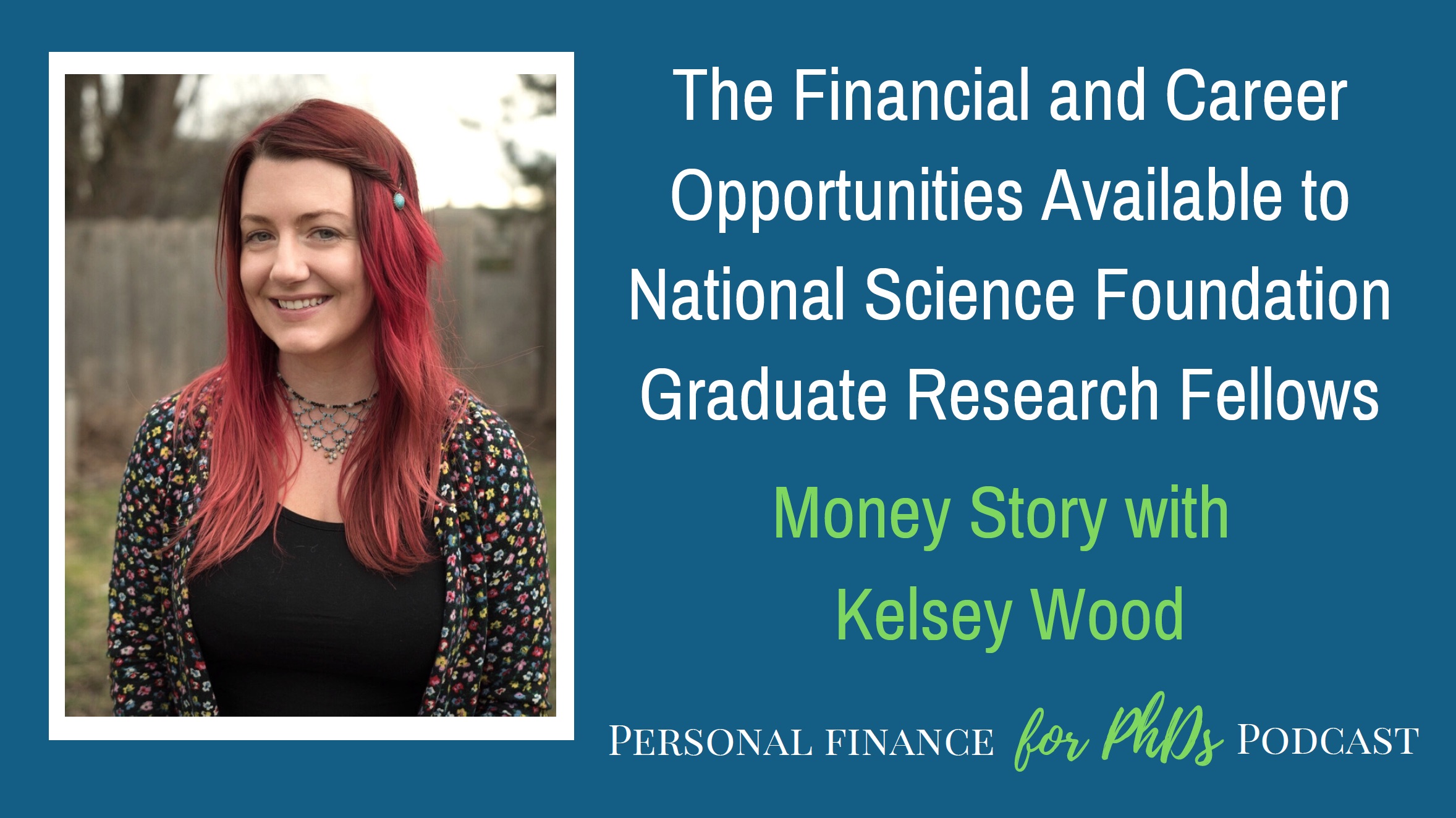In this mostly solo episode, Emily shares how to manage lump sum fellowship income with respect to your budget, cash flow, and bank account structure. Grad students and postdocs struggle to manage their money when they are paid less frequently than monthly, such as once per term or once per year. This lump sum income occurs for some fellowship recipients, though it’s not a common set-up. In the first half of this episode, Emily presents her suggested system for managing this type of income with respect to your bank account structure, budget, and cash flow. In the second half of this episode, Emily interviews Shalom Fadullon, a grad student at Northeastern who receives this type of income, on how she implemented Emily’s system in her financial life.
Links mentioned in the Episode
- Host a PF for PhDs Seminar at Your Institution
- Emily’s E-mail Address
- PF for PhDs System for Managing Lump Sum Fellowship Income
- SmartAsset Income Tax Calculator
- PFforPhDs Quarterly Estimated Tax for Fellowship Recipients Workshop
- PF for PhDs S7E15: How to Solve the Problem of Irregular Expenses
- PF for PhDs Subscribe to Mailing List
- PF for PhDs Podcast Hub
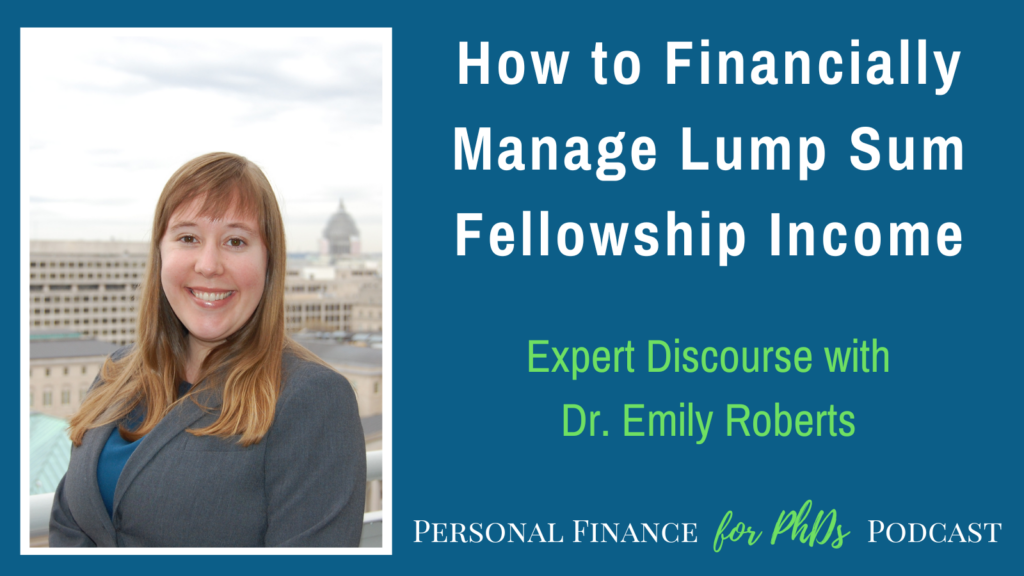
Teaser
Anonymous: Lump sum income is really challenging. I have found in thinking about this, that the issue of lump sum income is pretty inextricable for me from the issue of variable and unpredictable income. Dealing with all of that together can feel really hard, like super defeating, honestly, especially at a lower income bracket, which you know, PhD students are, it just feels like really a grind to be honest.
Introduction
Welcome to the Personal Finance for PhDs Podcast: A Higher Education in Personal Finance. This podcast is for PhDs and PhDs-to-be who want to explore the hidden curriculum of finances to learn the best practices for money management, career advancement, and advocacy for yourself and others. I’m your host, Dr. Emily Roberts, a financial educator specializing in early-career PhDs and founder of Personal Finance for PhDs.
This is Season 21, Episode 4, and today is a mostly solo episode from me on how to manage lump sum fellowship income with respect to your budget, cash flow, and bank account structure. I’ve found that grad students and postdocs struggle to manage their money when they are paid less frequently than monthly, such as once per term or once per year. This lump sum income occurs for some fellowship recipients, though it’s not a common set-up. In the first half of this episode, I’ll present my suggested system for managing this type of income with respect to your bank account structure, budget, and cash flow. In the second half of this episode, I’ll share my conversation with Shalom Fadullon, a grad student at Northeastern who receives this type of income, on how she implemented my system in her financial life.
By the way, if your university distributes some fellowships in lump sums, I’d bet that you’re not the only one wondering how to handle this type of income. I am now offering a live workshop that teaches this material and helps grad students and postdocs implement it in their financial lives. You can read more about it at PFforPhDs.com/financial-education/. Please email me at [email protected] if you’re interested in bringing this workshop to your university. You can find the show notes for this episode at PFforPhDs.com/s21e4/. Without further ado, here’s my episode on managing lump sum income.
Grad students and postdocs, by and large, do not like receiving lump sum income or once-per-term income. Research shows people prefer to be paid more frequently, like weekly over monthly, and so it follows that being paid once every three months or even once per year would be even less favorable. Grad students and postdocs are intimidated by the length of time this money is supposed to provide for, and it can become paralyzing! They are so afraid of running out of money before they receive their next paycheck that they underspend. It’s also natural to occupy the other end of the spectrum: they see a huge bank account balance and they’re tempted into a spending binge. And I’m sure there are cases when grad students do run out of money and have to survive on credit cards and personal favors until the next paycheck arrives. I definitely sympathize with feeling overwhelmed by the heavy responsibility of this frequency of income. I have to tell you, though, that I also see it as an opportunity.
The way paychecks work for employees is that you work and then you get paid after or near the end of the work period. In the case of a once-per-term fellowship, you’re being paid at or near the start of the period the money is associated with instead. Yes, you have to make the money last, but you get it up front, not at the end. That means you can pre-fund your financial goals and put big chunks of money aside for irregular expenses instead of saving up gradually from more frequent paychecks. In this episode, I’m sharing the system I recommend for managing once-per-term or lump sum fellowship income. This system was inspired by 1) this ability to fund financial goals up front, 2) how business owners, including myself, manage irregular income, and 3) how I managed my money when I was just starting out on my own and anxious about running out of money.
In the first half of this episode, I’ll explain the system. There are visuals and a template spreadsheet associated with this explanation. If you want to download these visuals and/or the template spreadsheet, go to PFforPhDs.com/lumpsum/. If you just want to see them, you can watch this episode on the show notes page at PFforPhDs.com/S21E4/ or on my YouTube channel. The second half of this episode contains excerpts from two interviews I conducted with Shalom Fadullon, a grad student at Northeastern who receives this type of income, on how she implemented my system in her financial life.
Part 1: My Recommended System
My proposed system for managing lump sum income has several components: your bank account structure, your cash flow, and your budget. I’ll explain each in turn.
1. Your bank account structure
Since one of the main paralyzing factors in receiving this income is that it comes in one big undifferentiated lump sum, our first step is going to be to divide it up into different bank accounts.
Separating the account that receives your lump sum of income from the account from which you do all your spending and making periodic transfers from the former to the latter is timeless advice from the self-employed. For example, my business bank account sees irregular income and irregular expenses, plus my business is seasonal, so the balance in that account can get quite high at certain times of year and be drawn down dramatically at others. I don’t want that irregularity and seasonality to affect my personal finances, so I pay myself a fixed salary once per month. The most fundamental way to improve your money management with lump sum income is to hold it in a separate account and regularly transfer smaller sums over to your normal account. This system goes beyond that, but that’s the principle from which it is derived.
An anonymous mailing list subscriber emphasized this principle in the following contribution to this episode: “My tip is to transfer most of the funds into a high yield savings account, then I will “pay” myself each month by dividing that lump sum by the number of months in a given semester. For example, in spring 2025, I received a lump sum of $12,000 in early January 2025. Since this money was to cover my living expenses from January to May (five months), I transferred $9,600 to my HYSA and left $2,400 of the total lump sum in my checking account. Finding a way to divide my lump sum into monthly income payments made my budget more manageable.”
Another anonymous mailing list subscriber used a slight variation on this strategy: “When I went on fellowship, I had everything deposited to a high yield savings account (Ally). I then figured out my monthly expenses and set up auto transfers to my checking account every two weeks, a little DIY payroll. I always earmarked a portion of the savings account for tax payment; the Ally accounts have “buckets” that you can designate within the account.”
Exactly! Even if you do nothing else as a result of listening to this episode, take that suggestion to keep the bulk of your lump sum in a high-yield savings account and simulate a salary with monthly transfers.
My system, however, uses a few more accounts.
I suggest housing all of the following accounts at the same bank for instantaneous transfers, as there will be a lot of transferring among the accounts. If you don’t want to open multiple accounts, you certainly don’t have to, but I do recommend it for transparency and to simplify your future decision-making.
Account #1 is a savings account nicknamed Overall Holding. This account should receive your lump sum of income. Money will be distributed from this account to the other accounts one time or on a recurring basis.
Account #2 is a savings account nicknamed Tax Self-Withholding. This account is where you will set aside from each lump sum payment the fraction that you expect to pay in income tax. The money will stay in this account until it’s needed for an estimated tax payment or to pay your annual tax bill.
Account #3 is not really an account but a placeholder for wherever you might transfer your money to fulfill your financial goals. It might be a savings account if you’re trying to build up cash savings, such as an emergency fund. It might be a certain debt you’re trying to pay down. It might be a Roth IRA or other investment account. It could be multiple of these accounts if you’re working on multiple goals simultaneously.
Account #4 is a single savings account nicknamed Targeted Savings or a set of savings accounts for the same purpose. This is where you will hold money to pay for the irregular expenses that will arise in about the next year.
Account #5 is a checking account nicknamed Fixed and Necessary Variable Expenses. This checking account will receive periodic cash infusions from your Overall Holding savings account and will be used to pay your fixed expenses and your necessary variable expenses. Fixed expenses are expenses that are the same every single month, like your rent or mortgage, your internet bill, and your Netflix subscription. This account is for both necessary and discretionary fixed expenses. It’s also for variable necessary expenses like groceries and utilities if they’re billed according to consumption.
Account #6 is a checking account nicknamed Discretionary Variable Expenses. This checking account will receive periodic cash infusions from your Overall Holding savings account and will be used to pay your discretionary variable expenses. Discretionary variable expenses are expenses that are different every month and that are completely optional, such as eating out, entertainment, and shopping beyond baseline needs.
One final note about bank accounts. This system does not work if you’re paying fees such as account fees or low balance fees. Furthermore, it’s best if the savings accounts are high-yield savings accounts. Basically, your banking should be completely free and give you a relatively high interest rate on your savings. I often suggest to PhDs and PhDs-to-be that they use an internet-only bank to gain these benefits, but I don’t normally insist on it. For your situation, I’m going to strenuously recommend that you house your money in an internet-only bank with the benefits I just mentioned. I personally use Ally and have for about fifteen years, and other banks that fit the bill are CapitalOne360, SoFi, and Discover.
Before we move on from this section, I want to briefly address the use of credit cards. A single credit card could take the place of the Discretionary Variable Expenses checking account. I would just recommend that you keep an eye on the balance so that it doesn’t exceed the amount you budgeted for that category of expenses. If you put charges of multiple types on multiple cards and want to use the two checking account system, you could pay each card down manually from each checking account according to how much you spent from each category of expenses. For example, if you charged $300 for groceries and $100 for eating out to the same credit card, you could pay it off with $300 from your Fixed and Necessary Variable Expenses checking account and $100 from your Discretionary Variable Expenses checking account.
2. Your cash flow
Now I’m going to explain how money should flow through the account structure I just laid out. Before actually moving money from your Overall Holding savings account to any of the other accounts, you need to plan your spending for the upcoming term, i.e., budget. We’re going to address that in the third section. But just know that before you actually enact the cash flow I’m about to describe, you’re going to have firm numbers in place for how much to transfer.
Step 1: Receive your lump sum paycheck into your Overall Holding savings account. It’s more common to receive paychecks in a checking account, but I suggest that you switch your direct deposit into your Overall Holding savings account instead. If your university won’t deposit your paycheck to a savings account or you couldn’t get it set up in time, you can manually transfer the full amount of the deposit from your checking account to the Overall Holding savings account as soon as possible after receiving it.
Step 2: Plan how to distribute your paycheck. I’m going to address this budgeting step more fully in the next section. Just know that it has to be done before actually moving your money around.
The most ideal time for this step and the subsequent one to occur is after you’ve received the lump sum but before you actually start spending it. This follows from the principle I expounded upon in Season 21 Episode 2 about living on time, which is that all of the income you receive in one month goes toward funding your next month’s budget.
How this principle plays out for lump sum income is like this. Let’s say you are scheduled to receive your lump sum paychecks on August 15, January 15, and June 15. Your August 15 paycheck should pay for your September through January expenses. Your January 15 paycheck should pay for your February through June expenses. Your June 15 paycheck should pay for your July and August expenses, presuming that you’ll receive another paycheck of some type in August. This way, you have some margin or breathing room in between when you receive the paycheck and when it needs to start going out the door to pay for expenses.
Now, that’s an ideal circumstance. I would imagine that it’s much more common to need to start spending the lump sum immediately on bills and groceries and paying off credit cards, because most Americans do not live on time. If that’s how you’re operating now, you just have to account for that in your budgeting step. I will emphasize, though, that you should use this lump sum to catch yourself up to living on time as best as possible over this term so that you can start your next lump sum budgeting period in the more ideal fashion. So if you have to start spending your August 15 paycheck on August 15, still plan for it to last you through January so you don’t have to repeat the process on January 15. This will help you out a ton, especially if that paycheck doesn’t arrive on the date you expect it, which has happened to fellowship recipients.
Step 3: Enact one-time distributions.
Make one-time transfers from your Overall Holding savings account to your Tax Self-Withholding savings account, Targeted Savings savings account, and Financial Goals account or accounts.
Step 4: Set up monthly distributions.
Set up a monthly autodraft from your Overall Holding savings account to your Fixed and Necessary Variable Expenses checking account. I suggest that this be scheduled for late in each month, perhaps on the 25th, as it will fund your spending starting on the 1st.
Step 5: Set up weekly distributions.
Set up a weekly autodraft from your Overall Holding savings account to your Discretionary Variable Expenses checking account. I don’t have a firm suggestion on which day of the week to make this transfer. Personally, I would choose either a Sunday to set up the subsequent Monday to Sunday week or a Thursday to set up the Friday to Thursday week.
Step 6: Manually transfer from targeted savings to your checking accounts as needed.
The function of the Targeted Savings savings account or accounts is to pay for irregular expenses. When one of those expenses occurs or is about to occur, make a manual transfer from the appropriate Targeted Savings savings account bucket to either your Fixed and Necessary Variable Expenses checking account or your Discretionary Variable Expenses checking account, whichever one will pay for the expense.
3. Your budget
The planning or budgeting step is crucial for people who receive lump sums of income. People who receive this type of income have a great fear of running out of money before the next paycheck comes, because that paycheck is so far away. Budgeting and sticking to your budget are therefore vital for giving you confidence to spend. In fact, if you budget and hold yourself strictly accountable to that budget, you can dispense with the other aspects of this system. The accounts and cash flow are really just to support you in sticking to your budget.
Another anonymous mailing list subscriber shared their perspective on the importance of budgeting when receiving lump sum income: “I highly recommend a Zero-Based Envelope Budget such as YNAB especially for people with lump sum income. The YNAB method of breaking large, infrequent and/or unpredictable expenses into small, consistent amounts is key; otherwise it is very easy to overspend early in the term then have a big unforeseen expense come up later in the term that you are not prepared for. Overall, breaking down big expenses, budgeting every dollar each month, and keeping account of over/under-spending (as the Envelope method does) gives clarity and confidence about what you can spend money on so you don’t run out before the next pay cycle. Plus, working towards getting “a month ahead” becomes harder with lump sum income but YNAB makes it easier to see your savings grow bit by bit.”
I created a template spreadsheet to assist you with this budgeting step, which you can download from PFforPhDs.com/lumpsum/. I’ll walk you briefly through the sections so you can see how they connect to your account structure and cash flow.
The first lines in this spreadsheet ask for the date of this term’s paycheck and next term’s paycheck. Remember that you should use this term’s paycheck to cover your expenses through the end of the month in which you receive your next paycheck. If there is some uncertainty about when your paychecks will arrive, use the last date in the feasible range.
The times at which you transition on and off of fellowship income are ones to pay particular attention to. There can sometimes be what feels like a lapse in pay, especially when going from fellowship income to employee income, again because employee income is typically paid after or at the end of your work period. For example, perhaps you receive a one-year fellowship that covers August through July, and after that you’ll receive employee income once per month. Perhaps those lump sums arrive near the beginning of August, the beginning of January, and beginning of June. Your first employee paycheck might not arrive until the end of August or beginning of September, meaning that your one-year fellowship actually has to pay for 13 months of expenses if you start using it in August. Or even if you’re paid bimonthly or biweekly as an employee, that first employee paycheck would arrive in mid-August and it will only be for half a month or two weeks of income. Keep these factors in mind when you decide how many months your lump sum income is supposed to pay for. You definitely don’t want to be caught paying for three months of expenses off of a two-month lump sum.
Up top, you enter your lump sum of income.
The orange section is for your estimated tax. If you are not having income tax withheld from your paychecks, you will need to set aside money to pay your future tax bills, whether they are quarterly estimated tax payments or an annual tax bill. If you are single and have a simple tax and income situation, I suggest using an income tax calculator such as from smartasset.com to estimate your annual tax bill. If you have a more complicated situation, you should fill out the Estimated Tax Worksheet on page 8 of IRS Form 1040-ES and the equivalent form from your state tax agency, if applicable. Once you’ve estimated your annual tax liability, you can fill into this section the appropriate fraction of that annual bill that needs to be paid from this particular paycheck. You can find lots more information about estimated tax inside my asynchronous workshop at PFforPhDs.com/qetax/.
The blue section is for your financial goals, and it refers to my eight-step financial framework. I won’t get into all the details of the framework, but basically, you should figure into this budget the amount of money you want to put toward your financial goals during this term. For example, if your goal is to invest 10% of your gross income into a Roth IRA, you would fill into the investing line 10% of your lump sum paycheck. This section has lines for investing, debt repayment above the minimum, and saving for an emergency fund. There is another line for creating account buffers. I do recommend placing a certain amount of money, perhaps $250 to 500, in each of your checking accounts to safeguard against overdrafting, just in case a bill comes in that is higher than what you budgeted. Try your best to maintain that buffer amount as your floor in your checking account, but know that it’s there for you if needed. You can consider it the first layer of your emergency fund.
The purple section is for your monthly expenses across several categories. You’ll enter a monthly spending number into each of the relevant line items. You’ll also enter the number of months that you want this budget to cover. The spreadsheet multiples these two numbers to generate the amount of money that you expect to spend on that expense during the term.
Some of these expenses are fixed monthly expenses, so they’re easy to look up and enter into the spreadsheet, such as your minimum debt payments, your rent or mortgage, certain utilities, and your subscriptions. Others are variable expenses, so they will change a bit month to month, such as groceries, gas, certain utilities, and eating out. If you have tracked data on these expenses, use those averages and round up a bit. If you haven’t tracked your expenses, do your best to estimate what you will or would like to spend.
The green section is for your irregular expenses, which are expenses that occur less frequently than monthly. Irregular expenses are things like insurance premiums if paid less frequently than monthly, car maintenance and repairs, travel, and electronics purchases. There are two ways to capture the numbers associated with these expenses in the worksheet. The first is to convert the irregular expense to a monthly average. For example, if in the course of the last twelve months you spent $600 on clothes and you don’t expect your spending rate to change, you would enter $50 as a monthly estimate of that expense into the appropriate cell. Over the course of a five-month term, for example, you would expect to spend $250. So you would know to set aside $250 of your paycheck into a targeted savings bucket for clothes. This is great for a category that you spend in regularly but not monthly. The second type of irregular expense that the spreadsheet accounts for is a large one-time expense. Let’s say that you want to purchase flights to visit your family over winter break, and you expect to purchase the tickets in November. You can enter the estimated cost of the tickets into the appropriate cell in this section, and you would know to set aside that amount of money from your paycheck into a targeted savings bucket for this purpose. You can learn more about irregular expenses and targeted savings in Season 7 Episode 15.
That takes us to the bottom of the spreadsheet. You of course need to make sure that your budget balances before moving on from this step.
From this spreadsheet, you can glean the numbers you need to set up your manual and automated transfers.
The total of your estimated income tax payments will be transferred one time from your Overall Holding savings account to your Tax Self-Withholding savings account.
With respect to your financial goals, I suggest transferring over or otherwise establishing your account buffer amounts right away. Same goes for any savings you want to add to your emergency fund. For financial goals money that you won’t be able to easily get back, before contributing it to a tax-advantaged retirement account or paying the principal on a debt, evaluate how confident you are in your budget. If you’re super confident that you’re not going to exceed your budget, invest or pay down debt right away after receiving the paycheck. If you’re not so confident, keep it in a savings account until the end of the term and put it toward those specific goals at that time. Or if you’re in between, split the difference by investing or repaying debt gradually throughout the term. One note though is that if your financial goal is to pay down credit card debt, do your absolute best to pay it down earlier rather than later, because that high interest rate is super toxic to your finances.
The amount of money that you calculated that you will spend on irregular expenses during this term or that you need to save for future irregular expenses should be transferred to your targeted savings account or accounts. Be sure to keep track, either using buckets or a spreadsheet, of which balances are for which purposes. If you deplete a targeted savings bucket, either stop spending in that category or adjust your plan.
The money that you expect to spend on your monthly expenses stays in your Overall Holding savings account until it’s time to be spent.
The sum of what you expect to spend monthly on your minimum debt payments, your fixed monthly expenses, and your necessary variable expenses should be transferred in a monthly autodraft to your Fixed and Necessary Variable Expenses checking account. This is the account from which you should set up autopay for all your bills and recurring expenses, such as rent or mortgage, utilities, minimum debt payments, and subscriptions. You should use this account to pay for your groceries and other necessary variable expenses as well. By the end of each month, the balance in this account should be down to pretty close to or at your buffer amount, hopefully not below. Due to the nature of these expenses, they don’t vary much month-to-month, so you can expect to spend all or nearly all of what you transfer in each month.
The sum of what you expect to spend weekly on your discretionary variable expenses such as eating out, entertainment, coffee, personal care, etc. should be transferred in a weekly autodraft to your Discretionary Variable Expenses checking account. The spreadsheet doesn’t calculate this weekly number for you, so you should divide the total you expect to spend over the term by the number of weeks in the term. Whatever balance you see in this account above your buffer amount, you should feel free to spend, but it’s also fine to carry over some balance or let it build up week over week.
Part of the point of dividing up your money is to help you discern when it’s time to stop spending. If the balance in your Discretionary Variable Expenses checking account is down to your buffer amount, it’s time to stop spending. However, you know that within a week, the account will be refilled.
If this system seems overly complicated, I definitely understand, and you can modify it to better fit your lifestyle.
Modification A: You don’t have to make the special effort to budget and set up targeted savings accounts for irregular expenses. Instead, you can create your budget with a monthly line item for miscellaneous expenses, as long as the amount of that line item exceeds the sum of the irregular expenses that you anticipate incurring during any given month.
Modification B: You don’t need two checking accounts. You can use one with either only monthly or monthly plus weekly transfers from your Overall Holding savings account. This will closely simulate a person who receives a monthly paycheck.
Commercial
Emily here for a brief interlude. Would you like to learn directly from me on a personal finance topic, such as taxes, goal-setting, investing, frugality, increasing income, or student loans, each tailored specifically for graduate students and postdocs? I offer seminars and workshops on these topics and more in a variety of formats, and I’m now booking for the 2025-2026 academic year. If you would like to bring my content to your institution, would you please recommend me as a speaker or facilitator to your university, graduate school, graduate student association, medical school, postdoc office, or postdoc association? My workshops are usually slated as professional development or personal wellness. Orientations, postdoc appreciation week, or close to the start of the academic year would be a perfect time for tax education or general personal finance content. Ask the potential host to go to PFforPhDs.com/financial-education/ or simply email me at [email protected] to start the process. I really appreciate these recommendations, which are the best way for me to start a conversation with a potential host. The paid work I do with universities and institutions enables me to keep producing this podcast and all my other free resources. Thank you in advance if you decide to issue a recommendation! Now back to our interview.
Part 2: Testing out my system with Shalom Fadullon
Emily: This first interview section was recorded in December 2024. This was the first time we met to discuss how to manage lump sum fellowship income.
Shalom: My name’s Shalom. I’m a third year, uh, chemical engineering PhD student at Northeastern University. Um, and I was fortunate enough to win the NSF GRFP this most recent cycle. So, um, I just, this just kind of started in September of this year and I’m planning on being it for the next three years. So looking forward, kind of figuring out like, okay, what does that, what does that look like now? So the way that it works at Northeastern, if you’re on any type of external fellowship, um, at least my department, um, you’re paid in one lump sum at the beginning of that semester. So over the summer it’s the same uh, thing. Our semesters are broken up into kind of like five months, five months and then two months for the summer. Um, so it’s a different amount of money, but it’s the same thing where you’re paid at the beginning of that two month period.
Emily: You know, when you emailed me with this question, like what were you concerned about, what, what problems had arisen that you think, you know, different budgeting might help with?
Shalom: Right, so my main uh, like kind of disconnect is this like thing where like your expenses, my expenses are kind of on this like monthly cycle where I pay rent every month, I pay my utilities every month and so all of a sudden these like payments and these expenses don’t really line up. Um, so like in my mind it’s like this very jagged graph of things happening and then so kind of having a harder time keeping track of like actually how much money I’m spending per month has been hard because instead of having like that monthly timeline, it’s now four, five months. Um, and then also kind of that like payday temptation. So hadn’t been paid in a long time, got that big, big pay bump or whatever that looks like it, but in reality the actual sum of money hasn’t changed. Um, it’s just from when you’re receiving it. So the temptation to spend money towards like that paycheck time is actually a lot harder, I found.
Emily: Shalom explained her existing account structure, which already had a lot of the elements that I recommend.
Shalom: A direct deposit into a high yield savings account. So um, that kind of just like automatically happens. And then I do just most of my purchases on a credit card and I pay that off every month. So again, like the monthly expenses kind of lining up. And then I also take some money out for like a retirement kind of like Roth I like IRA situation. Um, and that’s, yeah, that’s pretty much how that’s set up.
Emily: So the, the paycheck goes into the savings account first. Have you been keeping it there or did you move it to checking or did you split it? Like where’s the money been residing?
Shalom: Yeah, I mostly put it in um, it mostly just kind of stays in that savings account and then when I need to pay my credit card bill, that’s pretty much what I use it to do.
Emily: Okay. And you also have presumably some bills that you don’t pay on a credit card like your rent and maybe some other utilities or something. Do you then, do you transfer from savings to checking like in advance of those payments hitting? Okay. Yeah, I think you’re, it sounds organized, you’re like definitely partway to like what I would recommend, I’m just going to recommend and we’ll talk through it about, ’cause you don’t have to take my recommendations, right. It could be too much or whatever <laugh>, but kind of layering on a little bit more structure to this. Um, and also there’s sort of two components. There’s like this account structure which can help keep you on track to know that you’re not overspending or underspending over this long period of time. Um, and then there’s the budgeting aspect which is like actually planning because again it is a very long period of time. Like am I able to spend on discretionary things without jeopardizing, you know, my February rent payment or whatever it is. Right, right. Um, do you do any kind of budgeting right now?
Shalom: Yeah, I have um, roughly I try to do the like 30, 20, 50 rule. I don’t have like um, I dunno limits setup or anything within the account. So it’s kind of just like um, an Excel spreadsheet that I do and I’ll update it at the end of the month. But um, I have stopped updating it because my like income stream has changed so much. So
Emily: Like for a larger purchase, like a flight or like a vacation, something discretionary, maybe even shopping spree. Right, how do you decide if you can afford it?
Shalom: Yeah, that’s a great question. Um, so I kind of look at, again, I look at my credit card statement and I kind of say how much have I spent on similar things this month? So something like restaurants or going out to eat. Um, and then based on that amount of money, um, I’ll say okay, do I have enough money left to also purchase this? But it’s kind of very like hand wavy if that makes sense.
Emily: I feel like that would work really well with that two week budgeting cycle.
Shalom: Right.
Emily: But I dunno how you do it with these like larger amounts of money <laugh>. Yeah. Okay. At this point in our conversation, I proposed to Shalom the structure I explained in the first part of this episode.
Shalom: I mean I really like the idea of kind of having that account for the discretionary variable expenses because um, I feel like with the big um, like some payment it’s really hard to keep track of things like oh I bought a coffee, I bought a whatever. Um, so that’s really nice to kind of be able to track that more closely and see like, okay, how much am I putting in weekly? Like am I going over that, am I going under that whatever. Um, and I also like the idea of having kind of the two separate accounts for the necessary and variable expenses. I think like you mentioned, um, it might just get a little more complicated with the credit card kind of um payments, but I think it’s definitely like again there’s totally ways around that to make it not super complicated
Emily: After that, Shalom and I went through the budgeting spreadsheet that you can download from PFforPhDs.com/lumpsum/, and I sent her on her way to implement this system! We next spoke in mid-March 2025 about how the system implementation went. We next spoke in mid-March 2025 about how the system implementation went. After our last conversation and like the resources that I sent you and all that stuff, in theory you were supposed to try out <laugh> the system I was recommending. So please let me know like what changes did you make and did they work for you, have you made any adaptations?
Shalom: Yeah, sure. So um, we talked the last time we talked you recommended having these like separate pots essentially for things like essentials where it was like rent and food and utilities, kind of these like known quantities every single month. Um, there’s a pot for like discretionary spending, so like coffee and trips or whatever. Um, and then I think you also had a separate one for time like investments like Roth IRA, like things like that. And then um, a separate bin for taxes, like where you would set aside money for taxes. Um, in my specific bank. So I use Capital One, um, they make you open a new account for every bin you want. Um, so I just wanted to kind of keep it as simple as I could while following um, your advice. So I ended up opening one for like needs, one for wants and then one for, I had one for emergency fund and then one for um, investments. So I have five, that’s five total. Um, and it was actually really eyeopening because I used to just take um, all of my expenses out of like the account that I deposited money in and obviously when you’re getting these different amounts that don’t match up with like your monthly credit card cycle or your monthly rent cycle, um, I genuinely did not have a good grasp on how much I was spending and so it actually ended up being that I was spending more money um, than I thought and I just couldn’t see it because again, like the monthly balance wasn’t lining up with when I was getting deposits.
Emily: Yeah, that’s already like a really good insight. So kind of like dividing your money up <laugh> allowed you to see Yeah, the actual cash flow. So I think um, one of the other aspects of the system that you didn’t mention so far was I believe having your paycheck deposited into a savings account, right? Is that what we talked about? And then distributed to one or more checking accounts. So did you make any shifts in that or like where is your paycheck going and then literally like where is it flowing? Yeah, like from that first spot.
Shalom: So I did change that as well. So now I have my paycheck being deposited into a high-yield savings account. Um, and then from that high yield savings account, once I get that deposit I’ll put money towards um, my budget for like food rent, which I have like a rough number that I do the same amount every month and then um, things that I want or like extra funds. Um, and I think for me the most eye-opening thing was being able to track those like you know, eating out and clothes and whatever. Um, a little bit more closely because I had just been reconciling them with my credit card statement but I hadn’t actually seen what that was doing like overall big picture with kind of like long-term savings goals And so this was really helpful to be able to see that.
Emily: Let’s talk about the um, non monthly aspects of the system. So you mentioned for example there’s um, a way of you either holding for or transferring out money towards like investing or other sort of long-term goals. Um, if you have an emergency fund that theoretically should be like separate from the rest of this money. Um, and then the targeted savings was another thing we talked about. So saving up for those either necessary or discretionary expenses but that are sort of larger and that occur less frequently than monthly. So how have you been doing with like those aspects of the system and has that helped you think about your goals or your spending differently?
Shalom: Yeah, yeah that’s a good question. I actually hadn’t set up the targeted savings bin um, just because I wasn’t really sure how much I would wanna contribute per month or like what that might look like. Um, I think like a good idea would probably be to transfer, like saving up for a trip into that pot because right now I just have it in my like discretionary fund. Um, and I think like if I’m not taking a trip every month, then that is kind of inflating that bin maybe more than it needs to be. Um, so that’s something that I definitely like to do.
Emily: So it sounds like you’ve implemented the system like pretty close, like pretty faithfully to what I suggested, but now that you’ve tried it out, would you make any modifications to it going forward? So are we done with our discussion?
Shalom: I think so. Like I said, this has been really, really helpful. Um, like I said, I thought I was doing an okay job and I really saw, saw like a big difference um, in how I was doing this next pay period. So
Emily: Yeah, well I hope it continues to work for you for the next few years. However long this frequency is. I was really glad to hear that my suggestions, at least some of them, worked well for Shalom. And if you receive lump sum income, please let me know if you try out any or all of these elements and how it goes for you. I want to conclude here with a contribution from an anonymous podcast listener. I’ve actually worked with the most simple case of lump sum income in this episode, which is a predictable lump sum over the long term. This listener shared their perspective on the difficulty of receiving irregular lump sums of income in the following audio clip:
Anonymous: Lump sum income is really challenging. I have found in thinking about this that the issue of lump sum income is pretty inextricable for me from the issue of variable and unpredictable income. I’m a social sciences PhD, others in my program and other social sciences programs, humanities programs that I know have funding structures that are volatile, like quite unpredictable. We have maybe a baseline guaranteed income either from a fellowship for a given year or guaranteed teaching spots or something like that. I’m in a PhD in a very high cost of living area, one of the highest in the US. So that kind of baseline income is pretty difficult to live on, would pose a really significant financial strain. Folks like me are in the position of kind of constantly applying for supplemental income, whether that’s additional teaching positions over the summer or maybe you have a fellowship that allows you to teach one term out of the year to supplement the fellowship and so you’re in a situation throughout the year where you have a lot of uncertainty around what your actual income in a given year is going to be. I think that this informs how I experience an issue that’s maybe more in inherent in lump sum income, which is you wind up having to basically pay yourself monthly out of that income, which requires having a medium to long range sense of what your overall income actually is beyond a particular grant payment or lump fellowship payment or whatever it is. For folks that I know this is, these two things are super interlinked. The variability trying to project through that variability plan to the best of your ability accordingly and then a lot monthly payments for yourself based on that projection. The tip that I would give to people in this situation is I think that dealing with this tricky intersection of lump sum payments that are not taxed at dispersal and are uncertain and variable within throughout the year and across different years, um, dealing with all of that together can feel really hard, like super defeating honestly, especially at a lower income bracket which you know PhD students are, it just feels like really a grind to be honest. I think that it’s easy to kind of drop into a mode of why even try to plan around this. This is so difficult to plan around. This is set up to be almost impossible to project accurately around and like set up systems around. Like why even try and I’m not even making that much money anyway so I’ll just like do the best I can without thinking about it. I think it’s really easy to get into that mode and I see a lot of my friends in that kind of like survival mode. The tip would be support yourself around that and to try not to fall into that.
Emily: Lump sum income plus irregularity is definitely a next level challenge for your budgeting and financial planning, so my next challenge will be trying to speak to this situation. I echo what this contributor said to do your best to not feel defeated by this scenario, which honestly would stump the most experienced budgeters. Give yourself a lot of credit for managing as well as you are with a highly unpredictable income. That’s all for this episode! Thank you to Shalom for being my guinea pig for this system and thank you to those who shared their experiences and advice regarding lump sum fellowship income!
Outro
Listeners, thank you for joining me for this episode! I have a gift for you! You know that final question I ask of all my guests regarding their best financial advice? My team has collected short summaries of all the answers ever given on the podcast into a document that is updated with each new episode release. You can gain access to it by registering for my mailing list at PFforPhDs.com/advice/. Would you like to access transcripts or videos of each episode? I link the show notes for each episode from PFforPhDs.com/podcast/. See you in the next episode, and remember: You don’t have to have a PhD to succeed with personal finance… but it helps! Nothing you hear on this podcast should be taken as financial, tax, or legal advice for any individual. The music is “Stages of Awakening” by Podington Bear from the Free Music Archive and is shared under CC by NC. Podcast editing by me and show notes creation by Dr. Jill Hoffman.
